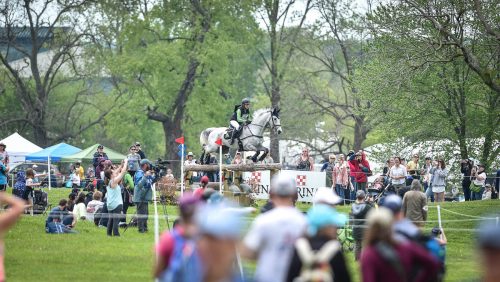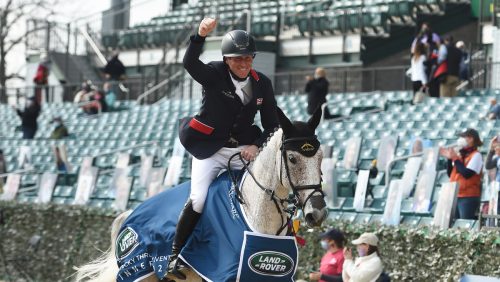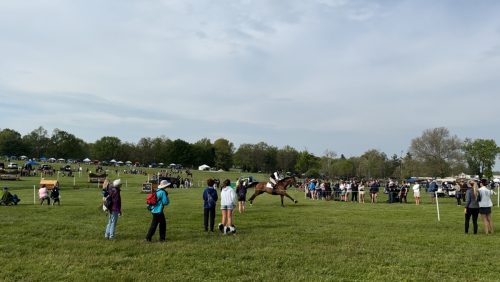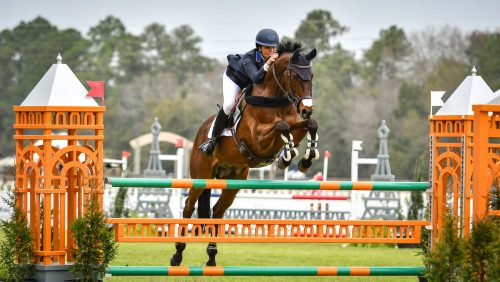A week after the U.S. Equestrian Federation parted way with its eventing performance director and managing director—announcements that came as a surprise even to some top athletes—CEO Bill Moroney told stakeholders within the sport that the staffing changes are part of a larger overhaul of the country’s high-performance eventing program.
Speaking today, Dec. 10, during the U.S. Eventing Association’s Annual Meeting and Convention in Albuquerque, New Mexico, Moroney said USEF recently completed a review of the program and got clear feedback from stakeholders that, while the program is working well at the emerging and developing athlete level, it needs to be restructured at a the “elite and pre-elite” levels to ensure future success. On Dec. 2, the organization announced it had not renewed the contract of Eventing Performance Director Erik Duvander, who had been leading the team since 2017, and the departure of Eventing Managing Director Jenni Autry.
“Throughout the process, we had an incredible amount of feedback, and one of the key points that made the decision-making process even harder was that Erik brought a certain element in the training that he did with people one-on-one, and they really valued and appreciated. However, the evaluations weren’t done off one situation; they were done off the analysis of multiple situations across the board that led us to the place that we are at today,” Moroney said.
“There’s always a minimum of two sides to every situation—and actually many times more than two sides to it—and that really became evident in the process, and the need to listen to all of the different perspectives people brought to us,” he added later. “But one of the most important elements of the analysis was looking for the common themes … We started to find seven or eight common themes, from leadership to communication to engagement to transparency to fairness, etc., but they ended up going into three major areas, which was the governance structure of the sport.”
The success of the U.S. dressage and show jumping programs could provide a blueprint for the restructuring of high-performance eventing, Moroney suggested, including those programs’ effective use of technical advisors rather than a performance director or team coach.
“I believe maybe it’s time to evolve to a technical advisor type of position for that, similar to what show jumping does,” he said, adding later, “In the dressage and jumping, we have extremely strong managing directors who have an extremely deep depth of experience with their sports, and so as a federation, what can we do as we go forward to make sure that the person in that position, [and] in all positions, gets the mentoring, gets the education, gets the resources they need to be as successful as possible?”
To answer those questions, USEF is in the processing of recruiting a task force to develop a restructuring plan—including a job description for the program’s next leader, which in itself will play a major role in how the program evolves—and hopes to have those people in place by year’s end to begin working with an outside facilitator “right after the first of the year,” Moroney said.
The task force would be appointed by USEF President Tom O’Mara, and a job description already has been posted internally and externally to recruit a new managing director.
“The overwhelming feedback was we need strong team leaders out there, whether it’s leading from an administrative side or leading from a sport side,” he said. “People want a leader, and they want leaders that they can follow in all phases of what we’re doing … that structure has to be addressed.”
ADVERTISEMENT
The timing of the restructuring, which leaves the U.S. Eventing Team without coaching leadership heading into the 2022 FEI World Championships (Italy) on the horizon, was unfortunate but necessary, he said.
“It could be challenging to find someone to fill that role out there; it just depends on what the role is and what the interest is out there,” he said. “But let’s be real here, and I’m not embarrassed to say, when I came into this job five and a half years ago, the first thing that I had to deal with was the fact that the discipline of eventing was not satisfied and wanted to make changes.
“Well, five and a half years later, we’re right back there: The sport of eventing wants changes to happen,” he continued. “And here we are again making changes. Something has to change, and we’ve heard it from the athletes: We cannot keep wash, rinse and repeat what we’ve been doing. We have to look at this hard, and we have to take the time, and that doesn’t mean we can’t also be concentrating on championships and keep moving. But we’ve got to find something that’s going to get this right, and we have to realize that there’s going to have to be flexibility; we’re going to have to make tweaks to it along the way; and we’re all going to have to be part of this as we go forward.”
Other pieces of the high-performance puzzle that will get a hard look in restructuring include interaction with the Owners Task Force and the Performance Advisory Team used to select training lists, which in 2021 included Duvander, Karen O’Connor, Leslie Law, Ian Stark, Derek DiGrazia and Kim Severson.
Not everyone participating in the USEA meeting agreed with Moroney’s assessment; one participant likened removing Duvander and Autry so close to the world championships to “shooting yourself in the foot.”
Moroney acknowledged the eventing team’s recent successes at international competitions in Aachen (Germany), Boekelo (the Netherlands), and Fair Hill, Maryland, but credited them in part to personal efforts made by the riders involved.
“When you look at those results, they were also created by the people that were at the table taking personal responsibility—personal responsibility for preparing themselves and their horses to arrive on competition day ready to go,” he said. “Some of those athletes had coaching from the USEF coach, some of those athletes did not, but they all came together, regardless of where they got the coaching, to establish a team culture at Aachen and Boekelo that was not present but is praised by the eventing community.”

Some developing riders, like Rebecca Brown, appreciated the guidance from Erik Duvander and would like that to continue with the next person to fill his position. Lindsay Berreth Photo
Athlete Rebecca Brown raised a concern about the future of developing riders, many of whom benefitted from Duvander’s approach, she said.
“I think the reason that you didn’t get much feedback from the developing riders, or that level of rider, is because one of the things that I think we could all agree upon is that Erik was very good at giving us a little bit of attention, or a step in the right direction that we’ve never had before,” she said. “He gave an opportunity to sort of ‘nobodies,’ I guess you could say, to have opportunities that were not presented to us before.”
ADVERTISEMENT
She worried those riders would be ignored if the USEF goes toward using a technical advisor for eventing.
Moroney acknowledged that developing riders are seeking mentorship and guidance, and that that would be a part of the task force’s discussion.

Erik Duvander helped coach riders like Liz Halliday-Sharp at major competitions. Lindsay Berreth Photo
Five-star rider Liz Halliday-Sharp said many riders had relied on Duvander and benefitted from his coaching both at home and at competitions, and she asked what they should expect from a currently coachless program.
“I would like to know more what the thought is on how that will look for major championships going forward, and also for overseas events, whereas in the past … we worked with Erik quite closely,” she said. “He knew the riders; he knew our horses. So when we went to something like that, if we couldn’t have our own coaches, that was fine because Erik sort of knew enough to help us through the cross-country, because he knew the horses and just helped us through all the warm up phases.”
Moroney agreed it was an important point, and that riders could use whichever coach they wanted, but USEF will have to look at credentialing issues for upcoming competitions to make sure those coaches have access to their riders.
“Those are some of the issues we need to deal with very quickly because we’re going to have championships coming up, and to make sure that we have somebody on the ground being a team leader that those of you that go feel you can rely on,” he said.
The USEA Convention continues virtually and in person through Sunday.
The Chronicle will have a wrap up of the USEA Convention on Monday on coth.com and in the January print edition.
















